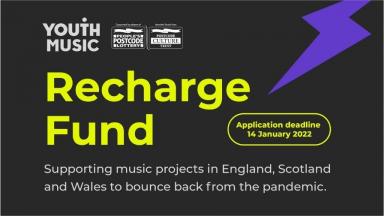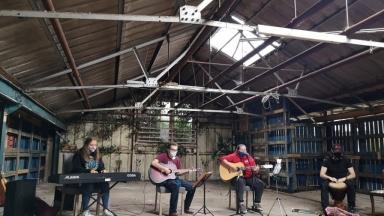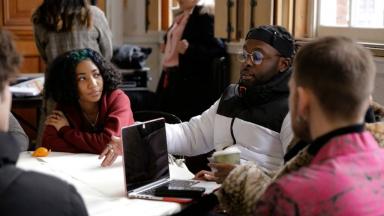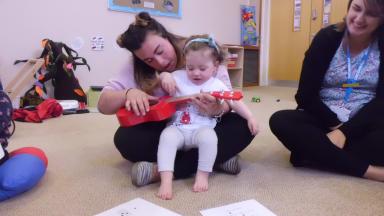Have questions about the Youth Music Recharge Fund? Find answers to our most frequently asked questions below.
Eligibility
We are based in England but our reach is international. Can we still apply?
It really depends on how your reach breaks down. We fund organisations who support children and young people in England, Scotland and Wales so we would want the majority of your beneficiaries to be based there. If most of your reach is international, we recommend that you do not apply.
Are there any restrictions for organisations currently in receipt of a grant from the People’s Postcode Lottery?
There are no restrictions.
Our reserves are higher than our annual running costs as the expenditures during the last financial year were exceptionally low due to the effects of the pandemic. Can we still apply?
Whilst the application form asks you to enter this data from the last financial year, we’re also asking for a copy of your management accounts to get an idea of what is going on in this financial year.
If your expenditure was down last year but has risen again this year, we are happy to use this year’s figures instead.
We will use your management accounts forecasts to obtain this information, we may ask for a bank statement to cross-reference against if you are successful.
We have reserves but also specific income losses due to pandemic. Can we still apply?
It depends on the amount of reserves you have. If they are higher than your annual running costs then you cannot apply.
Could you clarify what you mean by ‘free reserves’. Our ‘unrestricted funds’ are actually mostly made up of designated funds. Should we only count funds that are truly unrestricted (i.e. not these designated funds) as free reserves?
Correct. We do not include designated funds or restricted funds in our definition of free reserves. However, we will look at what the funds are delegated for when we assess your organisation’s need for the funding.
The criteria for the Recharge Fund identify that it is open to charities that have a turnover of up to £1 million. We have a turnover of just some little way above that. Can we still apply?
No.
One of our local services would like to apply for the Recharge Fund. Their turnover is less than £1,000,000 however the wider charity’s turnover exceeds this figure? Would the service still be eligible to apply?
No. The same applies if you are a department or service of a Local Authority.
Can community interest companies (CICs) apply?
Yes.
Proposal
What is likely to be funded?
All we know at this stage is that there will be a diverse mix of proposals funded. We expect to fund some proposals that contain some of the examples given in the guidance notes. But also new ideas too.
Are organisations allowed to apply for the salary costs of a new role?
Yes.
Does the funding need to be evenly spread between the two main focus areas?
No. You can split it however you want to.
Do we need to do any direct delivery with children and young people through this fund?
No. The focus of this fund is organisational and workforce development.
If an organisation works across multiple art forms (we cover music, dance and drama) would it be only staff working solely on music who could benefit? The majority of the young people we work with each year are young musicians.
In this instance it would be fine for the work to benefit other staff, so long as music is your organisation’s majority art form.
Budgets
Do the salaries in our proposal have to be at the real Living Wage level as a minimum?
Yes. Due to an admin error this criterion was not included in the first version of the guidance notes.
Do we need to find match funding?
No.
Can the money go towards increasing our reserves?
A portion of the money can go towards increasing your reserves. But remember that all proposals need to be for a minimum of one year and need to meet the two fund outcomes.
We’re not giving a maximum level that reserves could be built to, but would expect they wouldn’t be more than one year’s running costs and would be in line with your reserves policy.
Can the money go towards repaying a loan?
Yes, if the loan was taken out during COVID. And similar to the above question, remember that the totality of the proposal needs to meet both outcomes and last for one year.
Would you invest in organisations that are in deficit?
Yes.
Can funding be rolled over to year two if we have an underspend in year one?
Generally, yes. But you would need to seek approval at that time.
The guidance notes specify that you will keep 10% of the total grant as a final payment. Is this 10% of the full grant amount?
Yes. So if we made a grant of £10,000 we would keep £1,000 and release it once you had submitted your final report. However, if you had cashflow issues you could make a request to have it earlier.
Would you consider retrospective funding?
No.
Do we have to apply for the same amount each year, or could we apply for a decreasing amount year-on-year? e.g. if part of the funding is used to increase fundraising capacity, the hope would be that our funding position improves as time goes by.
You don’t have to apply for the same amount each year.
Consultancy costs are often quite difficult to estimate in advance so do you have any suggestions about how best to present potential consultancy costs?
Just give us the headline figures i.e. £10,000 for x consultancy. If you’re not getting specific quotes at this stage then ask around your peers to benchmark costs.
Application and process
Are you steering people towards set figures to apply for?
No, however when you are planning how much to apply for, we recommend you consider the following:
- How much you need.
- Your existing turnover. Don’t come in for an amount that is much higher than your current turnover.
- Any existing Youth Music grant. We won’t double-fund the same costs.
- The fact that we’ll be making fewer larger grants. That doesn’t mean you can’t come in for the full amount. It just means that the level of competition will be higher.
Might you say “Yes - but we will only give you 75% of what you asked for”?
This is possible, as we want to reach as many organisations as possible with the funding.
Do you have any preference as to the medium of the application - written, video or slides? We would like to consider a video submission but are nervous as to how we could pull together within the deadline and with all staff back to remote working.
The multiple format application is to make our application process more accessible to the applicant. We don’t mind what format it comes in.
With just 40 awards available and a lot of flexibility regarding what organisations can apply for, what criteria is Youth Music going to use to choose between strong applications? Will there be some balance given to ensure that the funding reaches all parts of the UK, for example?
Yes. We envisage funding work in every region of England. We’ll also make grants in Wales and Scotland. We want to see a diverse final portfolio. That means a mix of different types of proposal, organisation, levels of innovation and risk.
What level of reporting will be needed i.e. will there be interim and end of year reporting to do?
All grantholders will submit a final report. This covers:
- What you’ve done.
- Budget report.
- Leveraged funding (if applicable).
- Numbers of jobs and freelance roles supported.
- Learning and recommendations for others.
- What difference the grant has made for you linked to the fund’s outcomes.
- Any diversity and inclusion changes.
- Communications – options to include photos, case studies and quotes.
Grants of more than one year are required to submit an annual interim report. This covers:
- What you’ve done.
- Things that have affected your delivery.
- Priorities for the next phase.
- Change requests.
- Budget report.
You may also like...
Recharge Fund
The Youth Music Recharge Fund offers grants of up to £90k (max £30k per year) to boost organisations in their post-covid recovery.
How covid-19 has affected youth and music-making
This report brings together a range of data sources to analyse and reflect on how COVID-19 has affected youth music work in England.
Improving capacity and capability
Do you need inspiration for your Youth Music Recharge Fund proposal? Our project community have shared some recent examples of how they’ve improved capacity and capability. We’ve added our own experiences to these, alongside some ideas about how you might measure progress.
Improving wellbeing
Improving the wellbeing of staff, freelancers, volunteers, and young people means embedding wellbeing in your day-to-day working practices. But what does that actually mean? In this article we share some real examples from two organisations and consider ways you could measure improvements in your practices.




